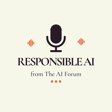
Colby Hawker, Product Manager, Natural Language AI, Google, on the changing economics of AI
This week on Responsible AI from the AI Forum, Colby Hawker, a natural language product manager at Google, joins Alex Alben and Patrick Ip to discuss the impact of AI on society and the economy.
Colby shares insights on the evolving approach to privacy in the current era compared to Web 2.0, highlighting AI's role as a collaborator rather than a replacement for human work. We explore privacy concerns surrounding AI models and delve into its potential applications in sectors like customer service, healthcare, and education.
Colby also addresses emerging challenges in AI, such as code generation and personalized medicine. Through their conversation, they emphasize AI's ability to enhance productivity and knowledge augmentation across industries, offering a glimpse into the transformative power of AI in today's world.
For more discussion, news, and thinking about responsible AI, visit our website, The AI Forum.
